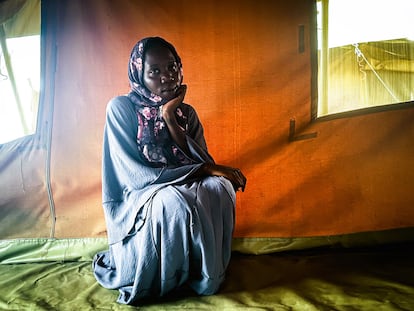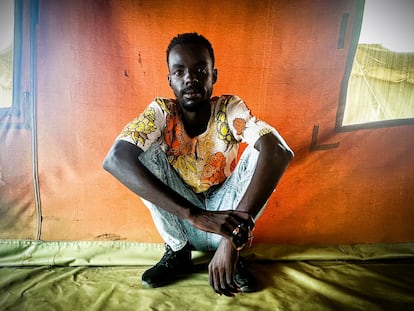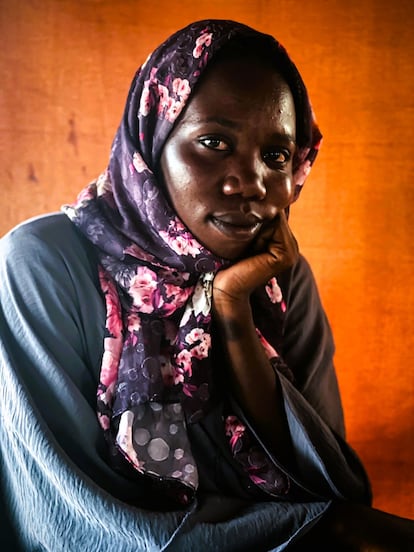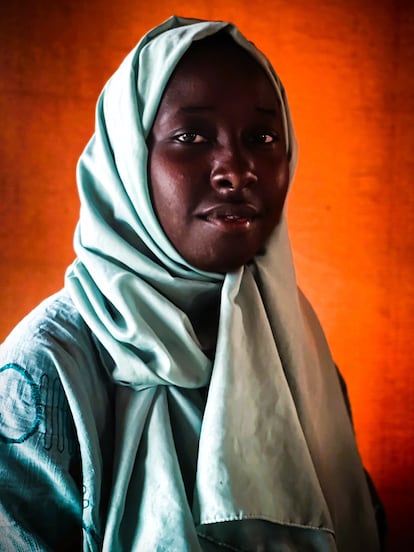From faculties to refugee camps: The war in Sudan has displaced thousands of university students
Sudanese higher education students – who have been forced to flee their homes due to violence – now live in poor conditions as displaced people, without any certainty about their education and their future


Emam Omam is almost an economist. Nyamiji Daniel is almost a programmer. Nosemba Walaldin is almost a teacher. And Renad Abdalkhaman dreams of being a surgeon.
These four students were all at different stages of completing their university degrees. They had the worries and responsibilities typical of twenty-somethings. That is, until a war blew up their lives. They have been forced to exchange their houses for the huts of a refugee camp. Classmates and study time have been replaced with loneliness and endless, empty hours.
Students such as Emam, Nyamiji, Nosemba and Renad have been damaged by the armed conflict that Sudan has been experiencing for the past eight months. The condition they’re facing isn’t as visible as a disease, nor is it as irreparable as death, but its impact is of immense proportions for hundreds of thousands of young people who, overnight, have been forced to replace their dreams of the future with the uncertainty of a life filled with need, danger and precariousness.
Of all the humanitarian emergencies in the world where there isn’t sufficient assistance, South Sudan is almost at the bottom. While it’s obscured in the media by other crises – such as Gaza or Ukraine – there hasn’t been a single day without refugees and catastrophes in this African country for almost a year. South Sudan is on the brink of collapse, with 9.4 million people in need of humanitarian assistance, or 76% of the population. Only 40% of the funds needed to address this have been secured, according to the UN Agency for the Coordination of Humanitarian Affairs (OCHA).
Emam Omam was a student at the Omdurman Islamic University, near Khartoum, the Sudanese capital. “I studied Economics because Sudan needs economists. Maybe I could get a job,” he explains. On April 15, 2023 – the day the war began – he was preparing for an exam. “I waited to see if the situation would calm down and I could finish [my courses]... but that wasn’t the case. My degree has stopped, everything has stopped. I no longer know what’s going to happen,” the young man sighs.
Sitting on a mat on the ground – in the shade of a canvas tent that barely offers protection from the intense heat – four young women of similar ages speak about what their life has been like since the violence pushed them out of their homes and classrooms. They’ve been living at a temporary shelter for refugees in Renk, a border town between Sudan and South Sudan.

“Those were very good times. As soon as I got up, I wanted to go to class, see my friends, have a good time with them, have fun. There was no time for anything, I was busy from morning to night,” recalls Nosemba Walaldin. The 23-year-old was in the last semester of her Information Technology degree, which she was completing at the University of Khartoum, the oldest university in the country. Nosemba missed the last exam that was required for her to finish her degree.
Nyamiji Daniel, 22 – a South Sudanese woman living in Khartoum – was studying the same subject at the same institution, but one grade below Nosemba. “I lived with a Sudanese family, because I [was employed as a domestic worker]. I got up at five in the morning, started working at six, then went to class and came home at four. From then on, I finished the rest of the housework,” she explains. Nyamiji studied and worked at the same time. She admits that this wasn’t easy… but now, she says that she would turn back the clock without hesitation.
“I had just finished my high school diploma and was planning to study Medicine. [Becoming a surgeon] is my dream,” says Renad Abdalkhaman. Having just turned 18, she’s the youngest of the four girls, but the most determined. She speaks loudly and clearly.
These four young people now live at the Renk Transit Center. More than 400,000 people have arrived through this border point over the last eight months, fleeing the civil war unleashed between the army and the paramilitaries of the Rapid Support Forces (RSF). This conflict has brought daily armed attacks to the streets of Khartoum, resurrected ethnic clashes in Darfur and has led to the forced displacement of more than six million people. It has also caused the suspension of exams and the closure of educational centers from the first days of the conflict.
The Renk Transit Center does not qualify as a refugee camp. It’s a settlement designed as a transit point for about 3,000 people, but Renad, Nyamiji, Nosemba and Emam have been stuck here for several months. More than 18,000 souls are crowded together, due to the incessant flow of arrivals from the neighboring country and the impossibility of transferring refugees to more suitable places. Seasonal rains have flooded and cut off entire roads. Here, the living conditions are dire, because everything is lacking: shelters, clean water, enough food, adequate sanitation, health and educational services.

19 million children left without class
Among all the traumas that any exodus caused by violence entails, there’s that which is faced by the students. Up to 19 million children are out of school, according to UNICEF and Save the Children. And an undetermined number – it could be more than 200,000, if we look at the latest enrollment figures provided by the government, from 2017 – have been left without a university. While Khartoum has always been a city proud of its intellectual tradition, in recent years, its higher education system hasn’t grown in size, due to poor funding, political interference and the economic crisis. There have been protests before, during and after 2019, when dictator Omar al-Bashir was deposed in a coup. This was followed by the massive floods of 2020 and the COVID-19 pandemic.

For refugee children in places such as Renk, at least there are some schools that different humanitarian organizations have set up in the camps. But the situation faced by students who were enrolled, or set to enroll, in the universities and technical colleges is a separate drama. Their specialized training cannot be found just anywhere. Hence, they suddenly find themselves in an inescapable state of limbo.
This is a cruel addition to the rest of the traumas that they carry, as they already have stories of fear and loss behind them. Renad – the youngest of the four young women interviewed – was born in Khartoum, but her parents emigrated to Saudi Arabia when she was a baby. At 16, they told her that they were going back. She was excited to get to know her country of origin… but that joy didn’t last for long. She hadn’t even been living in Sudan for a year when the attacks began.
“The first day, we hid at home. We heard shots outside. That night, a bomb fell right next door,” the teenager recalls. She has lost something much more important than her studies. “My father and my uncle went out one day to get something to eat and they never came back. We spent a month waiting for them. When we didn’t hear any news, my mother and I came here,” she concludes. Her voice trembles – the strong energy that emanates from her falters a little. “I feel totally destroyed. They’ve destroyed my future, our futures,” the teenage laments. She’s been at Renk since August 20.
Nosemba worked at a law firm in the afternoons after university. In her free time, she went out with her friends. “I’m still in contact with two who are in the White Nile [state]. I’ve lost track of the rest of them.” She arrived at the transit center on August 17, after a nine-day trip with her family, during which she almost lost a brother. “On the way some armed men stopped us, they wanted to take one of my brothers with them. We gave them everything we had so they would leave him,” she recounts.

The Scholars at Risk network (SAR) has chosen Sudan as one of the most worrying cases in its 2023 Free to Think report. The group warns that the civil war has seriously affected the education sector, including higher education. “In the early days of fighting, students and faculty members reported being forced to flee or being trapped, unable to flee, with no food, water, or electricity,” the report denounces. SAR has also reported on militants who have
killed, injured or raped students and teachers, warning that Sudan may face a serious shortage of teachers for the next school year, due to the number of people who have fled the country.
According to an SAR estimate, armed clashes and looting have damaged at least 104 public and private higher education facilities and research centers during the first five months of fighting. In at least one case, on June 4, the Sudanese Armed Forces appear to have targeted an institution of higher learning, bombing the campus of the International University of Africa during clashes with the RSF. 10 people were killed.
In recent years, there’s been a growing demand for higher education in refugee camps. Some initiatives have been developed, mainly thanks to the internet, which allows for online studies to be offered. There are also some scholarships, such as the Albert Einstein German Academic Refugee Initiative (DAFI), a program sponsored by the UN Refugee Agency (UNHCR) in 50 countries. It aims to ensure that refugees with strong academic abilities can pursue a university degree or higher education in a third country. But there are very limited spots and options. According to UNHCR, only 1% of the global refugee population finds a path to higher education, compared to a third of young people worldwide.

Of course, Nosemba, Nyamiji, Renad and Omam would like a scholarship like the DAFI, since all four of them dream of going away to continue their education. The young aspiring surgeon would like to go to the UK or Turkey. Nosemba – who would like to teach about new technologies – thinks that North America could be a good option. Eman wants to get a postgraduate degree in Political Science, while Nyamiji is happy to go wherever she can find a job.
For now, their dreams are farther away than ever before. These young people – along with others like them – feel that their future plans, their intellectual concerns and their efforts have all fallen on deaf ears. There are no guarantees that they’ll leave the refugee camps any time soon, even though they want to shake off a situation and a label which they don’t identify with at all. They’re university students, not refugees. They don’t understand how their lives have taken such a turn from one day to the next. Just thinking about this affects them deeply.
“If I start talking about how I feel, I’ll probably start crying. Life here isn’t good and, psychologically, I’m not well,” Nosemba acknowledges, with a broken voice. “I just hope we can get out soon and continue with our lives,” Renad adds. “The more time you spend in a place like this, the more tired you feel.”
Sign up for our weekly newsletter to get more English-language news coverage from EL PAÍS USA Edition
Tu suscripción se está usando en otro dispositivo
¿Quieres añadir otro usuario a tu suscripción?
Si continúas leyendo en este dispositivo, no se podrá leer en el otro.
FlechaTu suscripción se está usando en otro dispositivo y solo puedes acceder a EL PAÍS desde un dispositivo a la vez.
Si quieres compartir tu cuenta, cambia tu suscripción a la modalidad Premium, así podrás añadir otro usuario. Cada uno accederá con su propia cuenta de email, lo que os permitirá personalizar vuestra experiencia en EL PAÍS.
¿Tienes una suscripción de empresa? Accede aquí para contratar más cuentas.
En el caso de no saber quién está usando tu cuenta, te recomendamos cambiar tu contraseña aquí.
Si decides continuar compartiendo tu cuenta, este mensaje se mostrará en tu dispositivo y en el de la otra persona que está usando tu cuenta de forma indefinida, afectando a tu experiencia de lectura. Puedes consultar aquí los términos y condiciones de la suscripción digital.








































